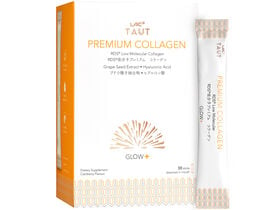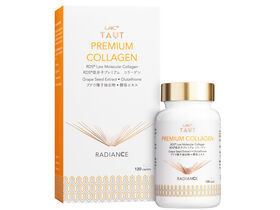Collagen
Collagen is the most abundant protein in the body, making up a third of the total protein composition. It is present in our muscles, skin, bones and tendons, working as a "glue" that helps hold the body together. It gives our skin strength and elasticity, and is responsible for the replacement and renewal of dead skin cells.
Collagen is well-known for its ability to support skin health, however there are also other roles in which it plays.
1. Skin - Firm skin, increase smoothness, renew and repair skin cells
2. Joints - Lubricate the joints so that tendons and ligaments move with ease
3. Nails and teeth - Strengthen nails and teeth as collagen is their building block
4. Cellulite or stretch marks - Improve skin's elasticity to reduce the appearance of cellulite and/or stretch marks
The body has the ability to produce collagen using amino acids. However as we age, the body's collagen production naturally slows down. As a result, it causes wrinkles, sagging skin and weaker cartilage in the joints surface. Other factors such as prolonged sun exposure, high intake of sugar and smoking can contribute to depleting collagen levels too.
There are three main types of collagen:
Type I: The main bulk of the body's total collagen and provides structure to skin, bones, tendons, fibrous cartilage, connective tissue and teeth
Type II: To promote joint and cartilage health
Type III: Usually found with type I, and mainly supports structure of muscles, organs and arteries
Common food sources include animal skin (e.g. pork, chicken) and bone broth.
Stay Inspired with Health Trends

Happy and Healthy Pregnancy Journey

The Power Of Vegetables

Smash Your 2026 Goals with Smarter Support: From Brain to Bones

8 Insider Tips for Healthier, Fuller Hair
Want fuller, healthier hair without a major routine overhaul? Here are 8 insider tips that break down exactly what your hair needs to look thicker, feel stronger, and give off that mane-character energy!

Enjoy the Holidays Without the Food Guilt

5 Essential Nutrients Your Body Need For Better Workouts

Have Yourself a Merry Healthy Christmas
It’s the most wonderful time of the year! Or is it?

Catch of the Day: LAC Omega and Trimax Series
Let’s be honest most of us don’t eat as much fish as we should. Between rushed lunches, busy evenings and the occasional dinners where there is fish, those “2-3 portions of oily fish per week” that nutritionists go on about often turn into, well… none. That’s where fish oil supplements swim to the rescue.
And among the sea of brands out there, is LAC Omega and Trimax Series worth the catch? Let’s dive in.

Hit the Road with These 6 Essential Travel Buddies
There’s nothing quite like the joy of travel - the chance to explore new horizons, immerse yourself in different cultures, and sample some of the world’s greatest flavours! But even the most seasoned globetrotters know that travelling isn’t always easy. Whether it is tummy troubles or travel fatigue, here are 6 essential travel buddies you need to keep you feeling your best wherever your journey takes you.



